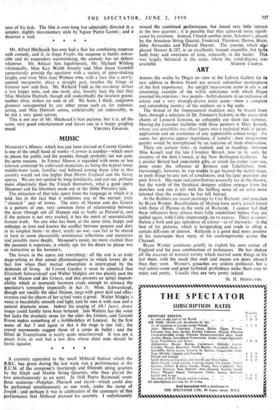MUSIC
MASSENET'S Manon, which has just been revived at Covent Garden, is one of the small band of work-:Carmen is another—which seem to please the public and the pundits, though probably for not quitL the same reasons. In France Manon is regarded with more or less tolerant contempt by cultivated musicians, as being the-typical lower middle-brow taste, familiar and beloved among those who;in this country would not rise higher than Merrie England and the Savoy operas. We are not spoiled by long familiarity, and can see, perhaps more objectively than the French themselves, what a good opera Massenet and his librettists made out of the Abbe Prevost's tale.
The attraction of that tale, apart from the language in which it is told, lies in the fact that it enshrines one of the eternal. truly " classical " pair of lovers. The story of Manon and des Grieux is a pattern of one, very common form of relationship between the sexes (though not all Manons end as badly as Prevost's), and if the pattern is not very exalted, it has the merit of unmistakable human truth. No one who has been, at the same time, happy and unhappy in love and known the conflict between passion and duty in its simplest form—in short, surely no one—can fail to be stirred at least to some pleasurable sentimental reflections and memories and possibly more deeply. Massenet's music, no more exalted than the passions it expresses, is wholly apt, for his desire to please was as instinctive as his heroine's.
The lovers in the opera are everything ; all the rest is as truly stage-setting as that unreal phantasmagoria in which lovers do in fact live when their mutual absorption is interrupted by the demands of living. At Covent Garden it must be admitted that Elizabeth Schwarzkopf and Walter Midgley are too plainly past the age of Manon and des Grieux, and this presents an initial improb- ability which at moments becomes crude enough to alienate the spectator's sympathy (especially in Act 3). Mme. Schwarzkopf, though not vocally the ideal Manon, sings with great skill and effec- tiveness and the charm of her actual voice is great. Walter Midgley's voice is beautifully smooth and light, and he uses it with ease and a natural dramatic sense. Indeed his singing of Ah! fuyez, douce image could hardly have been bettered. Jess Walters has the voice but lacks the dramatic sense for the elder des Grieux, and Geraint Evans makes something of a hobbledehoy of Lescaut. In the first scene of Act 3 and again in Act 4 the stage is too full ; the crowd movements suggest those of a corps de ballet ; and the Hotel de Transylvanie is surely quite misconceived. It was not a smart boite de nuit but a low dive whose chief note should be hectic squalor.


































 Previous page
Previous page